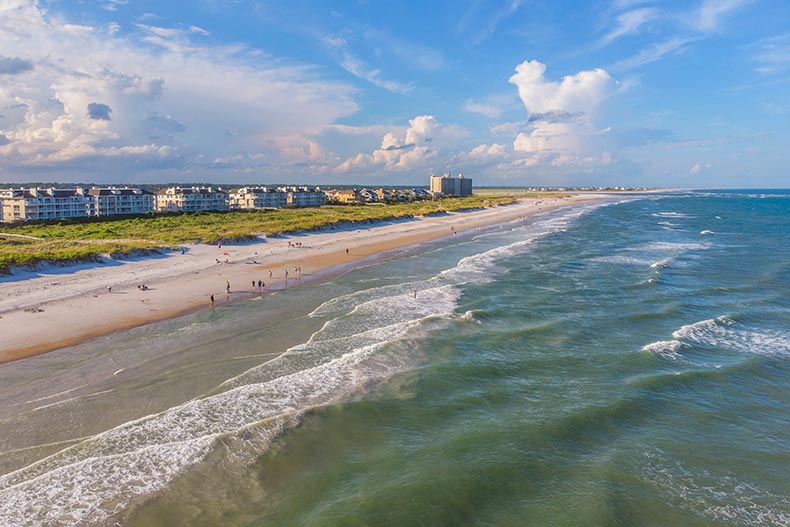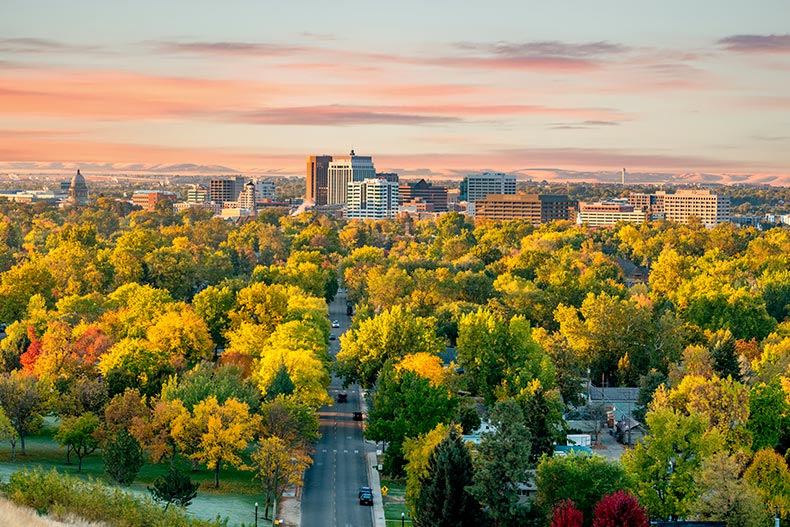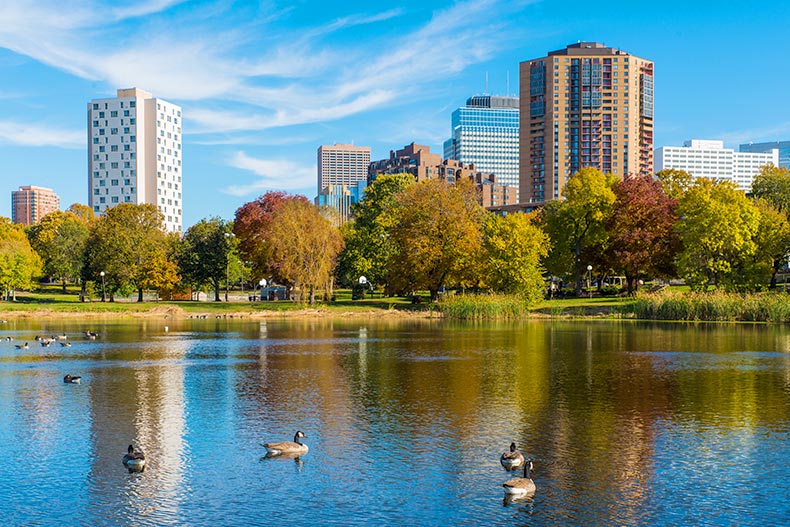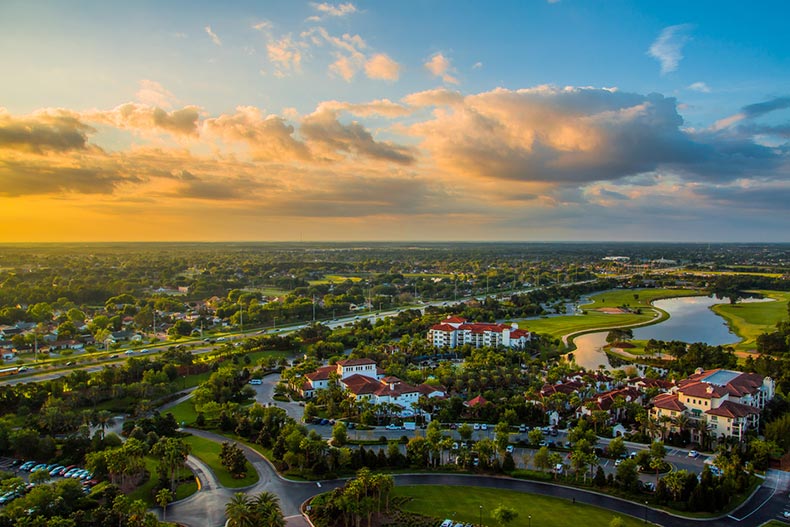Where you choose to call home can have a substantial impact on your overall health and, in turn, your quality of life. This is especially true for those living with chronic conditions. With proper care and attention, these conditions are often manageable but still require thoughtful planning when deciding to move to a new part of the country. Climate, geography, and access to health care providers are all key considerations for those with a chronic health condition.
Let’s explore some of the best places to retire if you have asthma and what factors may be particularly important to you in a retirement destination.
What Is Asthma?

Asthma is long-term inflammation of the lungs’ airways brought on by genetic, environmental, and in some cases, behavioral factors. According to the Centers for Disease Control, it affects some 25 million Americans of all ages, making it one of the most common chronic diseases.
While there’s no cure for the condition, careful management of lifestyle and environmental factors can help reduce the symptoms, which include a feeling of breathlessness, tightness in the chest, and wheezing.
Air Quality

It’s generally agreed upon that air quality, both indoor and outdoor, has a major impact on the frequency and intensity of symptoms for people living with asthma. Tobacco smoke, whether directly inhaled or in the form of second-hand smoke, is a major contributor to symptoms and should be avoided as much as possible. Thankfully for those with asthma, smoking indoors is largely a thing of the past in many parts of the country due to regulations enacted in recent decades.
Similarly, pet dander and strong perfumes can often trigger symptoms and, like tobacco smoke, are relatively easy to avoid. While it was once customary to be bombarded with spritzes of perfume when entering a department store, most retailers now have discontinued this practice to ensure the comfort of their customers.
Also, modern advances in vacuums, particularly those with HEPA filters, have made it much easier to effectively clean pet hair and dander from carpets and upholstered furniture.
The Bigger Picture

Indoor air quality is relatively easy to control and is usually a matter of personal choice. Vacuuming regularly and asking smoking visitors to step outside before lighting up usually does the job. What about the outdoors though? It’s true some areas of the country are likely to be much more comfortable than others for those with asthma.
Here are some general considerations to help guide travel and real estate decisions:
Air Pollution
This is the most obvious and, in some cases, visible cause of discomfort for those suffering from chronic breathing conditions. The Clean Air Act of 1963 and its later amendments have helped reduce air pollution over the years, but it’s still very much an issue to be mindful of.
There are a variety of different types, but the two that have the greatest impact on asthma sufferers are particulate pollution and ozone. Particulate pollution is easy to see—think of the dirty exhaust from a diesel motor or coal power plant. Ozone pollution is often associated with hot days and car exhaust which provide the right conditions for those ozone-action days you may have heard about during a weather report.
Geography and Weather
These two go hand-in-hand in their effects on air quality and, in turn, the quality of life for those living with asthma. Generally speaking, cities near bodies of water have a bit more wind which helps move the air, blowing out particulate pollution and pollen. Topography can have a big impact too. Anyone who’s ever lived in a river valley can tell you that air tends to settle, especially on hot, muggy days.
Weather and climate are, of course, affected by geography. Some people with asthma find extreme weather (think the heat of Southern Texas or the bitter cold of Northern Minnesota) can have a “shock” effect on their lungs while some are relatively undisturbed by this. Those who are impacted often find cities with milder, more consistent weather are more comfortable.
The Best Cities for Those With Asthma
Now that we understand some of the contributing factors, let’s discover some specific cities that can offer a comfortable retirement for active adults with asthma. (Keep in mind, this is not a definitive guide, and if you or a loved one is living with asthma, you and your doctor should discuss specific risk factors when making travel or homebuying decisions.)
Wilmington, NC

This beautiful and historic coastal city is ranked by the American Lung Association as one of the best cities in the country for outdoor air quality. Residents of Wilmington enjoy mild winters and, despite an average July high of 90 degrees, the area’s ocean breezes keep pollutants to a minimum. Also, for over 14 years, restaurants and bars in the state have been smoke-free, allowing diners to enjoy clean air inside as well.
Recommended 55+ Communities
- Del Webb Wilmington – Wilmington, NC
- The Village at Motts Landing – Wilmington, NC
- Porters Neck Plantation – Wilmington, NC
- Bellaport – Wilmington, NC
Boise, ID

Many people are attracted to the clean mountain air and active lifestyle that Boise promotes. A 46-mile greenbelt encourages active transportation, with many residents choosing to commute on foot, bicycle, or other non-motorized means.
Health care options are considered quite good, and the air quality is usually excellent—but it can be adversely affected during wildfire season which may bring in heavy smoke and particulate pollution. These effects can be mitigated by staying indoors during wildfires and investing in good air filtration systems.
Recommended 55+ Communities
Seattle, WA

Another coastal city on our list, Seattle shares many of the same benefits as other seaside communities. Freezing weather and heat waves are exceptionally rare (so much so that many homes don’t even have a central air conditioner). However, Seattle is well-known for its rain which can cause higher levels of mold and affect some people with asthma.
Smoking of both tobacco and legal cannabis is banned in all public areas and workplaces. The city has also, in large part, transitioned from heavy industry and shipping to a tech economy, leading to very low ozone and particulate pollution—all the better to take in the stunning mountain views.
Recommended 55+ Community
Minneapolis, MN

As an outdoors-lovers’ delight, Minneapolis enjoys excellent air quality year-round, owing to both its mild summers and windy winters. Stringent state environmental regulations keep the air and water clean, something Minnesotans pride themselves on.
The region is also home to some of the best health care providers in the country, including the renowned Mayo Clinic in nearby Rochester. This makes it easy for those with asthma or other chronic conditions to access expert medical care. However, it’s no mystery that the region’s winters are intense, so it’s best to keep that in mind if the cold is an aggravating factor.
Recommended 55+ Communities
- Four Seasons at Rush Creek – Maple Grove, MN
- SummerCrest – Brooklyn Park, MN
- Bellwether by Del Webb – Corcoran, MN
- Bards Crossing of Evermoor – Rosemount, MN
- Brooks Ridge – Chaska, MN
- Creekside in Edina – Edina, MN
- Hidden Pathways – White Bear Lake, MN
- Adelwood – Chaska, MN
- The Villas at River’s Edge – Rogers, MN
While many cities stand out for their excellent air quality, these are among the best and most diverse in the country. As you can see, there’s no “perfect” city for people living with asthma, and it’s best to weigh your own specific health needs against what these cities offer.
Whether you’re a tourist or looking to settle down more permanently, asthma doesn’t have to limit your options. Instead, it can lead you to some places that are as lively and captivating as they are beautiful. Contact 55places today for help finding your next perfect place to call home!

Discover what’s next.
To learn more information or connect with a real estate expert, contact us today.








